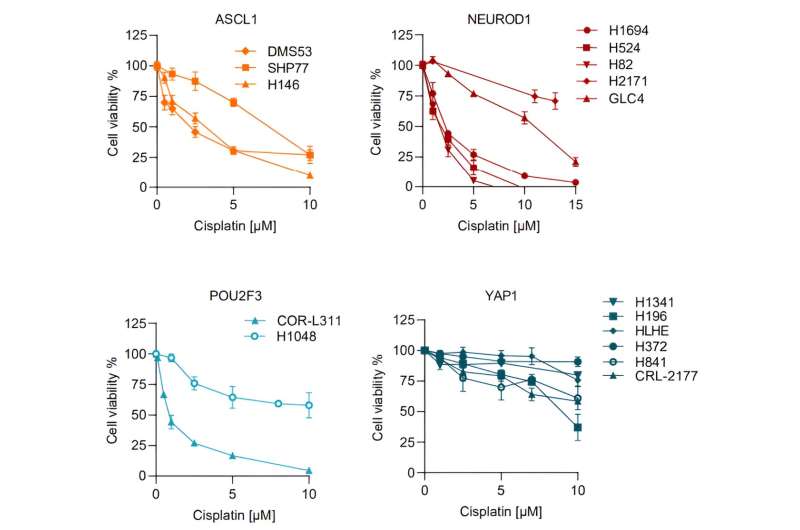This article has been reviewed according to Science X's editorial process and policies. Editors have highlighted the following attributes while ensuring the content's credibility:
fact-checked
peer-reviewed publication
trusted source
proofread
Small cell lung cancer: New approach to overcoming chemo-resistance

Small cell lung cancer accounts for about 15% of all diagnosed lung cancers and is still associated with a high mortality rate. SCLC tumors often develop resistance to chemotherapy and thus poor prognosis is due to tumor recurrence which occurs within only five to 14 months after initial diagnosis.
As a recent research study led by Balazs Döme and Karin Schelch from MedUni Vienna shows, resistant cell lines can be successfully fought with a combination of two already available therapeutic agents. The study results were published in the journal Clinical Cancer Research and offer a promising approach for the development of new therapies for this particularly aggressive type of tumor.
The study follows on from earlier, highly regarded findings by the research group led by Balazs Döme and Karin Schelch (Department of Thoracic Surgery at MedUni Vienna), according to which small cell lung cancer (SCLC) can be divided into subtypes that respond differently to chemotherapeutic agents and targeted drugs.
In this context, histone deacetylase inhibitors (HDACi) have been shown to be effective in two SCLC subtypes (known as SCLC-A and SCLC-N). HDACi are drugs that have already been shown in trials to be effective in fighting cells of different tumor types and have now been further investigated for their use in SCLC.
SCLC affects about 15% of lung cancer patients. This particularly aggressive tumor, which usually occurs in smokers, grows rapidly and has a high tendency to metastasize. About 70% of advanced cases are fatal within a year.
"The high mortality rate is due to the rapid and virtually inevitable recurrence of the disease, which is often accompanied by resistance to treatment," says principal investigator Karin Schelch, outlining the problem. HDACi in combination with standard chemotherapeutic agents turned out to be a possible solution during the studies. This significantly slowed down the growth of tumor cells that were resistant to individual therapy.
In further analyses, the molecular mechanism underlying therapy resistance was also revealed. The findings of the MedUni Vienna research group thus contribute significantly to a better understanding of the biology of SCLC, a disease in which promising progress in the development of therapeutic innovations has been decades in waiting.
"Our findings can provide the basis for research into successful new therapies that are superior to the resistance mechanisms of SCLC," says first author Anna Solta, also from MedUni Vienna's Department of Thoracic Surgery, highlighting the study's high clinical relevance.
More information: Anna Solta et al, Entinostat enhances the efficacy of chemotherapy in small cell lung cancer through S-phase arrest and decreased base excision repair, Clinical Cancer Research (2023). DOI: 10.1158/1078-0432.CCR-23-1795




















